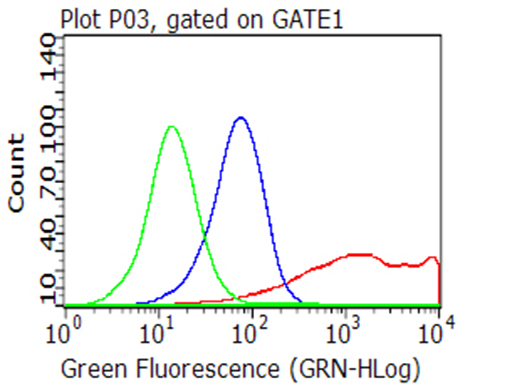CD40 Mouse Monoclonal Antibody [Clone ID: OTI3A7]
Frequently bought together (3)
Other products for "CD40"
Specifications
| Product Data | |
| Clone Name | OTI3A7 |
| Applications | FC |
| Recommended Dilution | FLOW 1:100 |
| Reactivities | Human |
| Host | Mouse |
| Isotype | IgG1 |
| Clonality | Monoclonal |
| Immunogen | Full length human recombinant protein of human CD40 (NP_001241) produced in HEK293T cell. |
| Formulation | PBS (PH 7.3) containing 1% BSA, 50% glycerol and 0.02% sodium azide. |
| Concentration | 1 mg/ml |
| Purification | Purified from mouse ascites fluids or tissue culture supernatant by affinity chromatography (protein A/G) |
| Conjugation | Unconjugated |
| Storage | Store at -20°C as received. |
| Stability | Stable for 12 months from date of receipt. |
| Predicted Protein Size | 30.62 kDa |
| Gene Name | CD40 molecule |
| Database Link | |
| Background | This gene is a member of the TNF-receptor superfamily. The encoded protein is a receptor on antigen-presenting cells of the immune system and is essential for mediating a broad variety of immune and inflammatory responses including T cell-dependent immunoglobulin class switching, memory B cell development, and germinal center formation. AT-hook transcription factor AKNA is reported to coordinately regulate the expression of this receptor and its ligand, which may be important for homotypic cell interactions. Adaptor protein TNFR2 interacts with this receptor and serves as a mediator of the signal transduction. The interaction of this receptor and its ligand is found to be necessary for amyloid-beta-induced microglial activation, and thus is thought to be an early event in Alzheimer disease pathogenesis. Mutations affecting this gene are the cause of autosomal recessive hyper-IgM immunodeficiency type 3 (HIGM3). Multiple alternatively spliced transcript variants of this gene encoding distinct isoforms have been reported. [provided by RefSeq, Nov 2014] |
| Synonyms | Bp50; CDW40; p50; TNFRSF5 |
| Reference Data | |
| Protein Families | Druggable Genome, Secreted Protein, Transmembrane |
| Protein Pathways | Allograft rejection, Asthma, Autoimmune thyroid disease, Cell adhesion molecules (CAMs), Cytokine-cytokine receptor interaction, Primary immunodeficiency, Systemic lupus erythematosus, Toll-like receptor signaling pathway, Viral myocarditis |
Documents
| Product Manuals |
| FAQs |
Resources
| Antibody Resources |
{0} Product Review(s)
0 Product Review(s)
Submit review
Be the first one to submit a review
Product Citations
*Delivery time may vary from web posted schedule. Occasional delays may occur due to unforeseen
complexities in the preparation of your product. International customers may expect an additional 1-2 weeks
in shipping.






























































































































































































































































 Germany
Germany
 Japan
Japan
 United Kingdom
United Kingdom
 China
China







